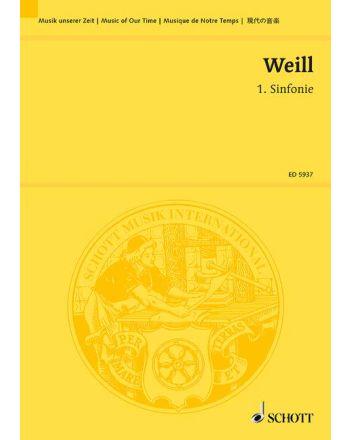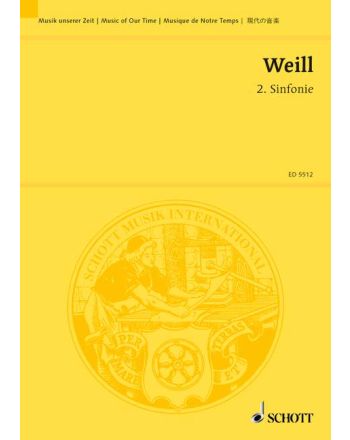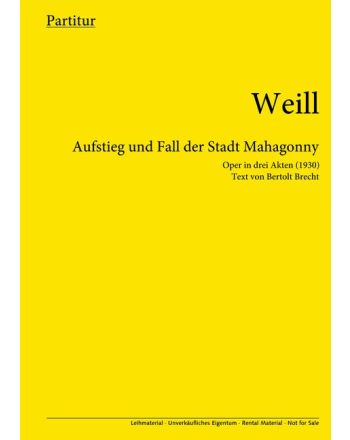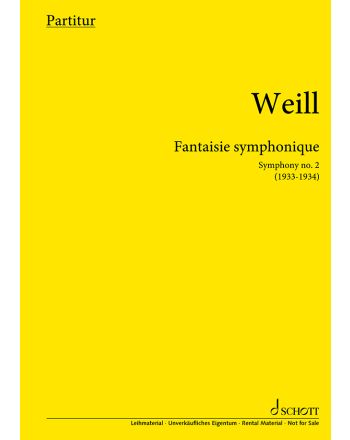
Kurt Weill
À venir
À propos de Kurt Weill
Kurt Weill was born in Dessau on 2 March 1900. Having displayed musical talent early on, he became a substitute accompanist at the Dessau Court Theater during the First World War, and - after studying theory and composition with Albert Bing - enrolled at the Berlin Hochschule für Musik. Not liking the training with Engelbert Humperdinck, though, he was accepted finally into Ferruccio Busoni’s master class in composition. In order to support himself, he conducted synagogue choirs, tutored students (e.g. Claudio Arrau, Maurice Abravanel) in music theory and contributed articles and reviews to "Der deutsche Rundfunk“.
By 1925, Weill had been established as one of the leading composers of his generation, along with Paul Hindemith and Ernst Krenek. In the same time, he turned to writing operas, collaborating a.o. with Georg Kaiser (e.g. Der Protagonist, Weill’s sensational theatrical debut in 1926, or Der Silbersee, 1933) and with Bertolt Brecht (e.g. Aufstieg und Fall der Stadt Mahagonny or the ballet The Seven Deadly Sins for Balanchine’s troupe). The Brecht-Weill piece Die Dreigroschenoper with its sometimes aggressive, sometimes sentimental popular song-style with elements of jazz, moritat and carabet songs remains one of his most famous works.
Weill’s compositions of the early thirties outraging the Nazis and campaigns discouraging productions of his work, Weill fled Germany in 1933 via Paris and London to America (in 1935) to oversee Max Reinhardt’s production of his opera Der Weg der Verheißung after Franz Werfel’s biblical spectacle. Weill and his wife Lotte Lenya stayed in the USA and applied for American citizenship.
Working mainly for Broadway, Weill established himself soon as a new and original voice in the American musical theater, often chosing unusual collaborators such as Paul Green, Maxwell Anderson, Ogden Nash, and Langston Hughes. He also completed two film scores, including Fritz Lang’s You and Me.
In 1946 Weill was elected as the only composer-member of the distinguished Playwrights Producing Company (founded in 1938) which brought his musical version of Elmer Rice’s Pulitzer-Prize winning drama Street Scene to Broadway as an American opera, the first real successor to "Porgy and Bess“. Weill’s experiment Lady in the Dark was a big success and his daring last two works for Broadway, the concept musical Love Life and the musical tragedy Lost in the Stars, challenged the Broadway institution and audience to a degree that would not be met until the 1970s in the Sondheim-Prince collaborations.
Apart from his numerous stage works (including pantomime, ballet, student opera and operetta), Weill wrote two symphonies and other orchestral works, two string quartets and different kinds of vocal works.
He died on 3 April 1950 in New York City.
- Kurt Weill Foundation for Music www.kwf.org
Liste d'œuvres
Chronologie
Produits
-
in einem SatzCompositeur: Kurt WeillEdition: Partition d'étudeInstrumentation: orchestreNuméro du produit: ED 5937Type de produitEn stockPrix à partir de 24,99 €TTC
-
Compositeur: Kurt WeillMedia Type: PartitionInstrumentation: chant et pianoNuméro du produit: EA 851Format papierFormat papierEn stock15,50 €TTC, hors expédition
-
for String QuartetFormat papierFormat papierÉpuisé41,00 €TTC, hors expédition
-
for String QuartetFormat papierFormat papierÉpuisé90,00 €TTC, hors expédition
-
Compositeur: Kurt WeillEditeur: David DrewEdition: Partition d'étudeSéries: Music Of Our Time
2. Sinfonie
Instrumentation: orchestreNuméro du produit: ED 5512Type de produitEn stockPrix à partir de 28,99 €TTC -
from the film "Where do We Go From Here?"Compositeur: Kurt WeillArrangeur: Jack MasonMedia Type: Matériel en location / d'exécutionEdition: Matériel d'exécutionLangue: AnglaisMatériel en location / d'exécutionMatériel en location / d'exécution
-
Opera in three actsCompositeur: Kurt WeillAuteur: Bertolt BrechtMedia Type: Matériel en location / d'exécutionEdition: Matériel d'exécutionLangue: Allemand, AnglaisMatériel en location / d'exécutionMatériel en location / d'exécution
-
Alabama-Song (R. Ettlinger)Compositeur: Kurt WeillArrangeur: Richard EtlingerMedia Type: Matériel en location / d'exécutionEdition: Matériel d'exécutionLangue: AnglaisMatériel en location / d'exécutionMatériel en location / d'exécution
-
Suite of music for violin and wind ensembleCompositeur: Kurt WeillArrangeur: David DrewMedia Type: Matériel en location / d'exécutionEdition: Matériel d'exécutionMatériel en location / d'exécutionMatériel en location / d'exécution
-
(Berlin Lit Up)Compositeur: Kurt WeillArrangeur: Otto LindemannMedia Type: Matériel en location / d'exécutionEdition: Matériel d'exécutionMatériel en location / d'exécutionMatériel en location / d'exécution
-
(Berlin Lit Up)Compositeur: Kurt WeillMedia Type: Matériel en location / d'exécutionEdition: Matériel d'exécutionMatériel en location / d'exécutionMatériel en location / d'exécution
-
for voice and jazz bandCompositeur: Kurt WeillArrangeur: Otto LindemannMedia Type: Matériel en location / d'exécutionEdition: Matériel d'exécutionLangue: AllemandMatériel en location / d'exécutionMatériel en location / d'exécution
-
(Songs of the Waterfront)Compositeur: Kurt WeillMedia Type: Matériel en location / d'exécutionEdition: Matériel d'exécutionLangue: FrançaisMatériel en location / d'exécutionMatériel en location / d'exécution
-
Kleine Kantate für Tenor, Bariton, MännerchorCompositeur: Kurt WeillMedia Type: Matériel en location / d'exécutionEdition: Matériel d'exécutionLangue: AllemandMatériel en location / d'exécutionMatériel en location / d'exécution
-
Schuloper in zwei AktenCompositeur: Kurt WeillMedia Type: Matériel en location / d'exécutionEdition: Matériel d'exécutionLangue: Allemand, AnglaisMatériel en location / d'exécutionMatériel en location / d'exécution
-
(A Kingdom for a Cow)Compositeur: Kurt WeillEditeur: Lys SymonetteMedia Type: Matériel en location / d'exécutionEdition: Matériel d'exécutionLangue: Allemand, AnglaisMatériel en location / d'exécutionMatériel en location / d'exécution
-
Radiolehrstück für Tenor, Bariton, Bass,Compositeur: Kurt WeillMedia Type: Matériel en location / d'exécutionEdition: Matériel d'exécutionLangue: AllemandMatériel en location / d'exécutionMatériel en location / d'exécution
-
Cantata for soprano, solo violin and orchestraCompositeur: Kurt WeillAuteur: Yvan GollMedia Type: Matériel en location / d'exécutionEdition: Matériel d'exécutionLangue: AllemandMatériel en location / d'exécutionMatériel en location / d'exécution
-
PantomimeCompositeur: Kurt WeillMedia Type: Matériel en location / d'exécutionEdition: Matériel d'exécutionLangue: AllemandMatériel en location / d'exécutionMatériel en location / d'exécution
-
Ein Wintermärchen in drei AktenCompositeur: Kurt WeillMedia Type: Matériel en location / d'exécutionEdition: Matériel d'exécutionLangue: Allemand, AnglaisMatériel en location / d'exécutionMatériel en location / d'exécution
-
Konzertfassung von David DrewCompositeur: Kurt WeillArrangeur: David DrewMedia Type: Matériel en location / d'exécutionEdition: Matériel d'exécutionLangue: AllemandMatériel en location / d'exécutionMatériel en location / d'exécution
-
Suite aus dem Wintermärchen (Salomon)Compositeur: Kurt WeillArrangeur: Karl SalomonMedia Type: Matériel en location / d'exécutionEdition: Matériel d'exécutionMatériel en location / d'exécutionMatériel en location / d'exécution
-
(The Eternal Road)Compositeur: Kurt WeillMedia Type: Matériel en location / d'exécutionEdition: Matériel d'exécutionLangue: Allemand, AnglaisMatériel en location / d'exécutionMatériel en location / d'exécution
-
Opera buffa in einem AktCompositeur: Kurt WeillMedia Type: Matériel en location / d'exécutionEdition: Matériel d'exécutionLangue: Allemand, AnglaisMatériel en location / d'exécutionMatériel en location / d'exécution
-
Oper in drei AktenCompositeur: Kurt WeillMedia Type: Matériel en location / d'exécutionEdition: Matériel d'exécutionLangue: AllemandMatériel en location / d'exécutionMatériel en location / d'exécution
-
(Kritische Neuausgabe)Compositeur: Kurt WeillAuteur: Bertolt BrechtMedia Type: Matériel en location / d'exécutionEdition: Matériel d'exécutionLangue: Allemand, AnglaisMatériel en location / d'exécutionMatériel en location / d'exécution
-
Foxtrott-PotpourriCompositeur: Kurt WeillArrangeur: Hartwig von PlatenMedia Type: Matériel en location / d'exécutionEdition: Matériel d'exécutionLangue: AllemandMatériel en location / d'exécutionMatériel en location / d'exécution
-
Blues PotpourriCompositeur: Kurt WeillArrangeur: Hartwig von PlatenMedia Type: Matériel en location / d'exécutionEdition: Matériel d'exécutionLangue: AllemandMatériel en location / d'exécutionMatériel en location / d'exécution
-
Tango-Ballade und Kanonen-SongCompositeur: Kurt WeillArrangeur: Jerzy FitelbergMedia Type: Matériel en location / d'exécutionEdition: Matériel d'exécutionLangue: AllemandMatériel en location / d'exécutionMatériel en location / d'exécution
-
Ballade von der sexuellen Hörigkeit (Berio)Compositeur: Kurt WeillArrangeur: Luciano BerioMedia Type: Matériel en location / d'exécutionEdition: Matériel d'exécutionLangue: AllemandMatériel en location / d'exécutionMatériel en location / d'exécution
-
bearbeitet von Max SchönherrCompositeur: Kurt WeillArrangeur: Max SchönherrMedia Type: Matériel en location / d'exécutionEdition: Matériel d'exécutionMatériel en location / d'exécutionMatériel en location / d'exécution
-
Oratorium nach "Der Weg der Verheißung", eingerichtet von Ed Harsh (2012)Compositeur: Kurt WeillMedia Type: Matériel en location / d'exécutionEdition: Matériel d'exécutionLangue: Allemand, AnglaisMatériel en location / d'exécutionMatériel en location / d'exécution
-
Der KuhhandelCompositeur: Kurt WeillEditeur: Claudia EderMedia Type: Partition électronique en PDFInstrumentation: tenor and pianoLangue: AllemandNuméro du produit: ED 21141 Q20382Partition PDFPartition PDFEn stock2,99 €TTC
-
(Symphony no. 2)Compositeur: Kurt WeillEditeur: James HolmesMedia Type: Matériel en location / d'exécutionEdition: Matériel d'exécutionInstrumentation: orchestreMatériel en location / d'exécutionMatériel en location / d'exécution
-
für OrchesterCompositeur: Kurt WeillMedia Type: Matériel en location / d'exécutionEdition: Matériel d'exécutionMatériel en location / d'exécutionMatériel en location / d'exécution
-
arrangement for voice and orchestra by Robert Russell Bennett (1952)Compositeur: Kurt WeillMedia Type: Matériel en location / d'exécutionEdition: Matériel d'exécutionLangue: AnglaisMatériel en location / d'exécutionMatériel en location / d'exécution
-
from "One Touch of Venus"Compositeur: Kurt WeillArrangeur: Paul WeirickMedia Type: Matériel en location / d'exécutionEdition: Matériel d'exécutionLangue: AnglaisMatériel en location / d'exécutionMatériel en location / d'exécution
-
for Voice and PianoCompositeur: Kurt WeillMedia Type: PartitionEdition: Réduction pour pianoInstrumentation: voix et orchestre ou pianoNuméro du produit: EA 853Format papierFormat papierEn stock45,00 €TTC, hors expédition
-
Version for high voice and orchestraCompositeur: Kurt WeillMedia Type: Matériel en location / d'exécutionEdition: Matériel d'exécutionLangue: AnglaisMatériel en location / d'exécutionMatériel en location / d'exécution
-
Version for low voice and orchestraCompositeur: Kurt WeillMedia Type: Matériel en location / d'exécutionEdition: Matériel d'exécutionLangue: AnglaisMatériel en location / d'exécutionMatériel en location / d'exécution
-
from "Love Life"Compositeur: Kurt WeillArrangeur: Jack MasonMedia Type: Matériel en location / d'exécutionEdition: Matériel d'exécutionLangue: AnglaisMatériel en location / d'exécutionMatériel en location / d'exécution
-
Komödie mit Musik in drei AktenCompositeur: Kurt WeillAuteur: Bertolt Brecht | Dorothy LaneMedia Type: Matériel en location / d'exécutionEdition: Matériel d'exécutionLangue: AllemandMatériel en location / d'exécutionMatériel en location / d'exécution
-
Bilbao SongCompositeur: Kurt WeillArrangeur: Hartwig von PlatenMedia Type: Matériel en location / d'exécutionEdition: Matériel d'exécutionLangue: AllemandMatériel en location / d'exécutionMatériel en location / d'exécution
-
Version für MezzosopranCompositeur: Kurt WeillArrangeur: Luciano BerioMedia Type: Matériel en location / d'exécutionEdition: Matériel d'exécutionLangue: AllemandMatériel en location / d'exécutionMatériel en location / d'exécution
-
suite from "Happy End" arranged by David DrewMedia Type: Matériel en location / d'exécutionEdition: Matériel d'exécutionLangue: AllemandMatériel en location / d'exécutionMatériel en location / d'exécution
-
Comedy with music in three actsCompositeur: Kurt WeillAuteur: Bertolt Brecht | Dorothy LaneMedia Type: Matériel en location / d'exécutionEdition: Matériel d'exécutionLangue: AnglaisMatériel en location / d'exécutionMatériel en location / d'exécution
-
arrangement of the Israeli National Anthem for orchestraCompositeur: Kurt WeillMedia Type: Matériel en location / d'exécutionEdition: Matériel d'exécutionMatériel en location / d'exécutionMatériel en location / d'exécution
-
from "Love Life"Compositeur: Kurt WeillArrangeur: Jack MasonMedia Type: Matériel en location / d'exécutionEdition: Matériel d'exécutionLangue: AnglaisMatériel en location / d'exécutionMatériel en location / d'exécution
-
Compositeur: Kurt WeillEditeur: Sherri JonesMedia Type: PartitionInstrumentation: pianoNuméro du produit: EA 829Format papierFormat papierÉpuisé18,00 €TTC, hors expédition
-
from "Knickerbocker Holiday"Compositeur: Kurt WeillArrangeur: Paul WeirickMedia Type: Matériel en location / d'exécutionEdition: Matériel d'exécutionLangue: AnglaisMatériel en location / d'exécutionMatériel en location / d'exécution












